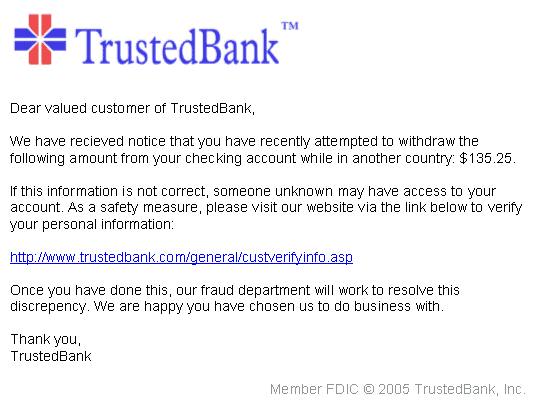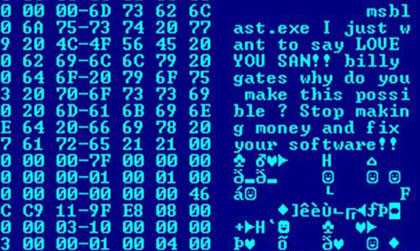|
Rock Phish
Rock Phish refers to both a phishing toolkit/technique and the group behind it. Rock Phish gang and techniques At one time the Rock Phish group was stated to be behind "one-half of the phishing attacks being carried out. VeriSign Verisign Inc. is an American company based in Reston, Virginia, United States that operates a diverse array of network infrastructure, including two of the Internet's thirteen root nameservers, the authoritative registry for the , , and gene ... reports them as a group of Romanian origin, but others have claimed that the group is Russian. They were first identified in 2004. Their techniques were sophisticated and distinctive, as outlined in a presentation at APWG eCrime '07. History In 2004 the first rock phishing attacks contained the folder path “/rock”, which led to the name of the attack, and group. Attackers employed wild card DNS (domain name server) entries to create addresses that included the target’s actual address as a sub-do ... [...More Info...] [...Related Items...] OR: [Wikipedia] [Google] [Baidu] |
Phishing
Phishing is a type of social engineering where an attacker sends a fraudulent (e.g., spoofed, fake, or otherwise deceptive) message designed to trick a person into revealing sensitive information to the attacker or to deploy malicious software on the victim's infrastructure like ransomware. Phishing attacks have become increasingly sophisticated and often transparently mirror the site being targeted, allowing the attacker to observe everything while the victim is navigating the site, and transverse any additional security boundaries with the victim. As of 2020, phishing is by far the most common attack performed by cybercriminals, the FBI's Internet Crime Complaint Centre recording over twice as many incidents of phishing than any other type of computer crime. The first recorded use of the term "phishing" was in the cracking toolkit AOHell created by Koceilah Rekouche in 1995; however, it is possible that the term was used before this in a print edition of the hacker magaz ... [...More Info...] [...Related Items...] OR: [Wikipedia] [Google] [Baidu] |
VeriSign
Verisign Inc. is an American company based in Reston, Virginia, United States that operates a diverse array of network infrastructure, including two of the Internet's thirteen root nameservers, the authoritative registry for the , , and generic top-level domains and the and country-code top-level domains, and the back-end systems for the , , and sponsored top-level domains. In 2010, Verisign sold its authentication business unit – which included Secure Sockets Layer (SSL) certificate, public key infrastructure (PKI), Verisign Trust Seal, and Verisign Identity Protection (VIP) services – to Symantec for $1.28 billion. The deal capped a multi-year effort by Verisign to narrow its focus to its core infrastructure and security business units. Symantec later sold this unit to DigiCert in 2017. On October 25, 2018, NeuStar, Inc. acquired VeriSign’s Security Service Customer Contracts. The acquisition effectively transferred Verisign Inc.’s Distributed Denial of Servi ... [...More Info...] [...Related Items...] OR: [Wikipedia] [Google] [Baidu] |
Malware Toolkits
Malware (a portmanteau for ''malicious software'') is any software intentionally designed to cause disruption to a computer, server, client, or computer network, leak private information, gain unauthorized access to information or systems, deprive access to information, or which unknowingly interferes with the user's computer security and privacy. By contrast, software that causes harm due to some deficiency is typically described as a software bug. Malware poses serious problems to individuals and businesses on the Internet. According to Symantec's 2018 Internet Security Threat Report (ISTR), malware variants number has increased to 669,947,865 in 2017, which is twice as many malware variants as in 2016. Cybercrime, which includes malware attacks as well as other crimes committed by computer, was predicted to cost the world economy $6 trillion USD in 2021, and is increasing at a rate of 15% per year. Many types of malware exist, including computer viruses, worms, Trojan h ... [...More Info...] [...Related Items...] OR: [Wikipedia] [Google] [Baidu] |
Social Engineering (computer Security)
Social engineering may refer to: * Social engineering (political science), a means of influencing particular attitudes and social behaviors on a large scale * Social engineering (security), obtaining confidential information by manipulating and/or deceiving people and artificial intelligence See also * Cultural engineering * Manufacturing Consent (other) * Mass media * Noble lie * Propaganda * Social dynamics * Social software * Social technology * Urban planning Urban planning, also known as town planning, city planning, regional planning, or rural planning, is a technical and political process that is focused on the development and design of land use and the built environment, including air, water, ... {{disambiguation Social science disambiguation pages ... [...More Info...] [...Related Items...] OR: [Wikipedia] [Google] [Baidu] |

